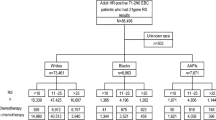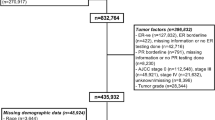Abstract
It is unknown whether racial differences exist in adjuvant chemotherapy initiation among women with similar oncotype DX (ODX) risk scores. We examined whether adjuvant chemotherapy initiation varied by race. Data come from the Phase III, Carolina Breast Cancer Study, a longitudinal, population-based study of North Carolina women diagnosed with breast cancer between 2008 and 2014. We used modified Poisson regression and report adjusted relative risk (aRR) and 95 % confidence intervals (95 %CI) to estimate the association between race and adjuvant chemotherapy initiation across ODX risk groups among women who received the test (n = 541). Among women who underwent ODX testing, 54.2, 37.5, and 8.3 % of women had tumors classified as low-, intermediate-, and high-risk groups, respectively. We observed no racial variation in adjuvant chemotherapy initiation. Increasing ODX risk score (aRR = 1.39, 95 %CI = 1.22, 1.58) and being married (aRR = 2.92, 95 %CI = 1.12, 7.60) were independently associated with an increased likelihood of adjuvant chemotherapy in the low-risk group. Among women in the intermediate-risk group, ODX risk score (aRR = 1.15, 95 %CI = 1.11, 1.20), younger age (aRR = 1.95, 95 %CI = 1.35, 2.81), larger tumor size (aRR = 1.70, 95 %CI = 1.22, 2.35), and higher income were independently associated with increased likelihood of adjuvant chemotherapy initiation. No racial differences were found in adjuvant chemotherapy initiation among women receiving ODX testing. As treatment decision-making becomes increasingly targeted with the use of genetic technologies, these results provide evidence that test results may drive treatment in a similar way across racial subgroups.

Similar content being viewed by others
References
Aizer AA, Chen MH, McCarthy EP et al (2014) Lack of reduction in racial disparities in cancer-specific mortality over a 20-year period. Cancer 120(10):1532–1539
Wheeler SB, Reeder-Hayes KE, Carey LA (2013) Disparities in breast cancer treatment and outcomes: biological, social, and health system determinants and opportunities for research. Oncologist 18(9):986–993
Hershman D, McBride R, Jacobson JS et al (2005) Racial disparities in treatment and survival among women with early-stage breast cancer. J Clin Oncol 23(27):6639–6646
Bickell NA, Wang JJ, Oluwole S et al (2006) Missed opportunities: racial disparities in adjuvant breast cancer treatment. J Clin Oncol 24(9):1357–1362
Roberts MC, Wheeler SB, Reeder-Hayes K (2015) Racial/ethnic and socioeconomic disparities in endocrine therapy adherence in breast cancer: a systematic review. Am J Public Health Apr 23:e1–e12
Paik S, Shak S, Tang G et al (2004) A multigene assay to predict recurrence of tamoxifen-treated, node-negative breast cancer. N Engl J Med 351(27):2817–2826
Paik S, Tang G, Shak S et al (2006) Gene expression and benefit of chemotherapy in women with node-negative, estrogen receptor-positive breast cancer. J Clin Oncol 24(23):3726–3734
Harris L, Fritsche H, Mennel R et al (2007) American Society of Clinical Oncology 2007 update of recommendations for the use of tumor markers in breast cancer. J Clin Oncol 25(33):5287–5312
Lund MJ, Mosunjac M, Davis KM et al (2012) 21-Gene recurrence scores: racial differences in testing, scores, treatment, and outcome. Cancer 118(3):788–796
McGee SA, Durham DD, Tse CK, Millikan RC (2013) Determinants of breast cancer treatment delay differ for African American and White women. Cancer Epidemiol Biomark Prev 22(7):1227–1238
Zou G (2004) A modified poisson regression approach to prospective studies with binary data. Am J Epidemiol 159(7):702–706
Zou GY, Donner A (2013) Extension of the modified Poisson regression model to prospective studies with correlated binary data. Stat Methods Med Res 22(6):661–670
Hebert PL, Sisk JE, Howell EA (2008) When does a difference become a disparity? Conceptualizing racial and ethnic disparities in health. Health Aff (Millwood) 27(2):374–382
IOM (2014) Institute of Medicine (US) committee on understanding and eliminating racial and ethnic disparities in health care, Washington, DC
Roberts MC, Bryson A, Wheeler SB et al (2015) Barriers and facilitators for the use of oncotype DX use among oncologists: a qualitative study. In: Academy health annual research meeting, Minneapolis
Lund MJ, Brawley OP, Ward KC et al (2008) Parity and disparity in first course treatment of invasive breast cancer. Breast Cancer Res Treat 109(3):545–557
Wheeler SB, Carpenter WR, Peppercorn J et al (2012) Predictors of timing of adjuvant chemotherapy in older women with hormone receptor-negative, stages II-III breast cancer. Breast Cancer Res Treat 131(1):207–216
Enewold L, Zhou J, McGlynn KA et al (2012) Racial variation in breast cancer treatment among Department of Defense beneficiaries. Cancer 118(3):812–820
Du XL, Key CR, Osborne C (2004) Community-based assessment of adjuvant hormone therapy in women with breast cancer, 1991–1997. Breast J 10(5):433–439
Hershman D, Weinberg M, Rosner Z et al (2003) Ethnic neutropenia and treatment delay in African American women undergoing chemotherapy for early-stage breast cancer. J Natl Cancer Inst 95(20):1545–1548
Hershman DL, Wang X, McBride R et al (2006) Delay of adjuvant chemotherapy initiation following breast cancer surgery among elderly women. Breast Cancer Res Treat 99(3):313–321
Fedewa SA, Ward EM, Steward AK, Edge SB (2010) Delays in adjuvant chemotherapy treatment among patients with breast cancer are more likely in African American and Hispanic populations: a national cohort study 2004–2006. J Clin Oncol 28(27):4135–4141
Aizer AA, Chen MH, McCarthy EP et al (2013) Marital status and survival in patients with cancer. J Clin Oncol 31(31):3869–3876
Bremnes RM, Andersen K, Wist EA (1995) Cancer patients, doctors and nurses vary in their willingness to undertake cancer chemotherapy. Eur J Cancer 31A(12):1955–1959
Hayman JA, Fairclough DL, Harris JR, Weeks JC (1997) Patient preferences concerning the trade-off between the risks and benefits of routine radiation therapy after conservative surgery for early-stage breast cancer. J Clin Oncol 15(3):1252–1260
Guth AA, Fineberg S, Fei K, Franco R, Bickell NA (2013) Utilization of oncotype DX in an inner city population: race or place? Int J Breast Cancer 2013:653805
Hassett MJ, Silver SM, Hughes ME et al (2012) Adoption of gene expression profile testing and association with use of chemotherapy among women with breast cancer. J Clin Oncol 30(18):2218–2226
Acknowledgements
We thank Dr. Andrew Olshan for facilitating the use of the Carolina Breast Cancer Study, Phase III data and for supporting this work. We also thank Mary Beth Bell, the Project Director for the CBCS, and Chiu Kit Tse for her programming and data management support. This work was funded in part by the University of North Carolina, Lineberger Cancer Control Education Program (CCEP) (R25 CA57726), the University Cancer Research Fund of North Carolina and the National Cancer Institute (NCI) Specialized Program of Research Excellence (SPORE) in Breast Cancer (P50-CA58223); By Author: MCR: CCEP (R25CA57726); MW: Veterans Affairs Health Services Research and Development Senior Research Career Scientist (RCS 91-408); SBD: National Institutes of Health (NIH) Building Interdisciplinary Research Careers in Women’s Health (BIRCWH) K12 Program and North Carolina Translational and Clinical Sciences Institute (UL1TR001111); MAD: Agency for Healthcare Research and Quality (AHRQ) K99 HS022189; KRH: NIH BIRCWH, 5K12HD001441-12; MAT and LAC: P50-CA58223; SBW: AHRQ Comparative Effectiveness Research Career Development Award, 1-K-12 HS019468-01 and American Cancer Society Mentored Research Scholar Award, MRSG-13-17-01-CPPB.
Author information
Authors and Affiliations
Corresponding author
Ethics declarations
Conflicts of interest
Dr. Michaela Dinan has been consulting for Salix; this work is unrelated to the research presented in this paper. The authors declare that they have no conflict of interest.
Electronic supplementary material
Below is the link to the electronic supplementary material.
Rights and permissions
About this article
Cite this article
Roberts, M.C., Weinberger, M., Dusetzina, S.B. et al. Racial variation in adjuvant chemotherapy initiation among breast cancer patients receiving oncotype DX testing. Breast Cancer Res Treat 153, 191–200 (2015). https://doi.org/10.1007/s10549-015-3518-9
Received:
Accepted:
Published:
Issue Date:
DOI: https://doi.org/10.1007/s10549-015-3518-9




